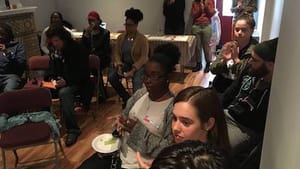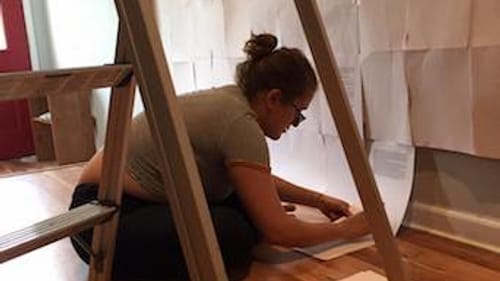Stay in the Loop
BSR publishes on a weekly schedule, with an email newsletter every Wednesday and Thursday morning. There’s no paywall, and subscribing is always free.
Enacting bravery, pushing paradigms
Millennials in my basement

I have millennials in my basement. They’re down there making a play. I know we are supposed to hate millennials because they destroy the housing market with avocado toast and refuse to accept that life is meaningless toil, but I am jealous of them, and a little bit in love. In addition to being perfectly happy making their work among my camping equipment and Christmas decorations, the millennials in my basement do not care about their “careers.”
Following the rules
When I was at their stage of life, all I wanted was for someone to hit me with a big rubber stamp that said “REAL ARTIST.” In college, I was surrounded by grown-up theater people who were happy to take advantage of that longing and fear. Sure, out in the world, my professors scrabbled for realness, too, but in our classrooms, they enjoyed the privilege of defining it. They used that position to ransom our dreams and give us the same message my immigrant grandparents got when they arrived here: material success is the only success; the alternative is failure of a deeply shameful and personal nature.
And it is personal. There’s nothing like the vulnerability of admitting that you want to be an artist and then “failing.” You’re commercially successful or you’re a cliché. You’re the accountant with a screenplay or the actress who’s really a waitress. The farther a person is from the leisure class, the funnier the joke. As a young person, I thought I could buy the right to make art by going to school. I wanted to be protected from the humiliation of amateurism as much as I wanted to learn the craft of world creation. Maybe more.
So, when I (like every 20-year-old theater maker before me) created a company after college, we immediately formed a board and applied for 501c3 status. We met in the conference room of the law office where one of us had a day job, dwarfed by the giant leather swivel chairs, talking about budgets and insurance and compliance. Then we printed up tickets and made our loved ones pay for them. Our moms handed us $15 across a card table in exchange for a program. We were like children playing pretend.

I wanted to make art that would change the world, but instead I used art to remake the world as it was. Whatever we did onstage, most of our energy went into creating a construct in which we were artists and our friends and family were cast as our fans. Theatercraft is the power to make things real — once you try something and it feels true, it’s very difficult to call it impossible anymore. Instead of using our creative talent to imagine a world where we succeeded within the given boundaries, why didn’t we try making a world where boundaries didn’t matter?
Ignoring the rules
But the millennials in my basement don’t waste time aping commerce. They already understand theater can be a career, but for most of us, by choice or circumstance, it’s actually something else. Versed as they are in looking past binaries, the millennials skip the legit-professional/loser-hobbyist dichotomy and embrace that theater can also be a vocation, gig, calling, or spiritual practice. As young artists and young citizens, they look at their lack of access to institutional resources and, instead of plotting how to grab those resources, walk away from the whole institution. It’s brave, sincere, and quick on its feet — all the things a clunky 501c3 with a season and budget can’t afford to be.
In this moment, enacting bravery matters. Creating spaces that do not care about institutional approval matters. If we stop chasing resources and legitimacy and start using our tools for rewriting what’s true, then theater could start to really matter.
I don’t believe radical content in theater will bring social change. Theater just doesn’t hold that place in U.S. life anymore. But radical change in the way that we make our work can do that. As great a show as Hamilton is, the reason it affected people outside the theater world is that it changed the rules about who could participate and how.
The millennials in my basement are truly radical not because they produce shocking content, but because they work in a way that actively proves it is possible to do things differently. A tiny, artisanal play, lovingly handcrafted for a small audience, is proof that beauty doesn’t have to be rarefied. A play in someone’s kitchen, office, or minivan is proof that we don’t have to buy access to have a voice. A play where the audience chooses what will happen is a rehearsal against hierarchy.
The only thing stopping us is the idea that someone ought to tell us we can. That person isn’t coming, and it doesn’t matter. We have all we need to make plays that matter right now. I know: I’m watching it happen.
Sign up for our newsletter
All of the week's new articles, all in one place. Sign up for the free weekly BSR newsletters, and don't miss a conversation.

 Cara Blouin
Cara Blouin